Eat Fat, Live Long—the Real Food of Okinawa
By Stanley A. Fishman, author of Tender Grassfed Meat
You may have heard about the longevity and health of the Okinawan people. According to records kept by the Japanese since 1879, the people of Okinawa just may be the longest-lived people in the world, often staying healthy and active into their nineties, or even longer.
Many have claimed that this longevity and health is due to a low-fat, meat-free, high-vegetable diet. Being skeptical of such claims, I researched traditional Okinawan cooking and traditions.
My skepticism was justified, as it usually is. The long-lived, healthy people of Okinawa eat a diet that is heavily based on meat. Mostly pork. Mostly fat pork. The main cooking fat is pork lard. Many foods are fried in pork lard. The Okinawans traditionally do not rely on doctors when they get ill, but on food-based remedies consisting of—pork organs. In fact, pork is so vital to Okinawan culture that Okinawans often refer to their land as the “Island of Pork.â€
The real lesson of Okinawan longevity is “Eat fat, live long.â€
The Real Food of Okinawa
Okinawan cuisine is centered around meat. The most important meat is pork. The Okinawans have a saying, that they use every part of the pig except for the toenails and the squeal. Many of the pork parts eaten are composed almost entirely of fat, such as pork skin, pig ears, and pork belly. All the internal organs of the pig are regularly eaten, such as the liver, kidneys, stomach, and intestines, which are also full of fat. Pork lard is the fat of choice for cooking, and many foods are deep fried in pork lard. Every other part of the pig is also eaten, including more familiar parts like spareribs, pork shoulder, and pork loin. The skin is usually left on and eaten whenever possible.
Goat is also favored by Okinawans, though pork is far more common. What is interesting is that much of this goat meat is eaten raw, and there are restaurants that specialize in the preparation of raw goat meat.
Traditionally, the Okinawans ate very little grain, which used to be sold to pay taxes. Sweet potatoes are a common and favorite food, as are cabbages, carrots, and other vegetables. Vegetables are always cooked, often fried in pork lard.
The Okinawans do eat tofu, but the tofu they eat is different. It is made differently from the rest of the tofu in the world, and is often naturally fermented for several months. Unfermented tofu is often deep fried in pork lard. One of the most common Okinawan dishes is a stir fry made out of pork, vegetables, and tofu, fried in pork lard. It is possible that the protective factors in the pork lard prevent the harm that often occurs from eating soy.
Miso, another fermented soy product, is also used as a seasoning.
Okinawans do not eat that much seafood, which is surprising given that Okinawa is a relatively small island. The explanation is that Okinawa has a tropical climate, and fish spoil very quickly. The island has very rugged terrain, which made it difficult to transport fish before they spoiled. Fish are fermented and made into sausages, which form a small, but important part of the diet.
Most Okinawans do not eat western-style processed and refined foods, though a small amount of brown sugar is used in cooking.
Okinawan Healing with Food
Traditionally, Okinawans had no medical doctors, but relied on food to heal themselves. This system was based on the organs of animals, usually pigs, but often goats. The traditional belief was that disease was caused by an imbalance in an organ, and the imbalance could be corrected by eating the corresponding part of an animal. Someone with breathing difficulty would eat the lungs of a pig. Somebody with a hearing problem would eat the ears. Someone with a digestive problem would eat the stomach of a pig, and/or the kidneys, and so on.
This system is not unique to Okinawa. It was followed by many traditional peoples, including the Native Americans, and by many Western M.D.s before prescription drugs became the remedy of choice.
This system worked so well that many Okinawans still follow this tradition, and do not seek medical help. This may actually contribute to their longevity, because the side effects of the drugs and surgeries used by modern medicine cause the death of many people.
The Real Okinawan Food Is Consistent with the Research of Dr. Weston A. Price
Dr. Weston A. Price spent 10 years studying the diets of the last healthy peoples on Earth. These peoples were free of the chronic diseases that plague the modern world. Dr. Price did not just read studies, he actually traveled right to the people he studied and observed them personally. Dr. Price found a number of similarities in the diets of these people:
- They ate a large amount of animal fat.
- They ate a substantial amount of meat and/or seafood.
- They ate a large amount of organ meats regularly.
- They ate some of their meat and/or seafood raw.
- They ate many kinds of natural foods, unrefined and unprocessed.
- They ate a number of naturally fermented foods.
- They ate at least a small amount of seafood, fermented if they could not get it fresh.
All of these factors are present in the real Okinawan food.
- The Okinawans eat a great deal of pork fat.
- The Okinawans eat a substantial amount of pork and goat.
- The Okinawans eat organ meats regularly.
- The Okinawans eat raw goat meat.
- The Okinawans eat most of their food unrefined and unprocessed.
- The Okinawans eat a number of naturally fermented foods.
- The Okinawans regularly eat a small amount of fermented seafood.
In summary, the diet of the Okinawans is very similar to the diet of the healthy peoples studied by Dr. Price. The longevity of the Okinawan people is further evidence of the benefits of the diet developed by Dr. Price.
Related Posts
Call It Medical, Not Mediterreanean
This post is part of Real Food Wednesday , Fight Back Friday and Monday Mania blog carnivals.
RSS feed for comments on this post.
Sorry, the comment form is closed at this time.
Read more
« Finding Grassfed Fat, and How to Add Good Fat to Lean Meat
Corn Shortage? Let Them Eat Grass »
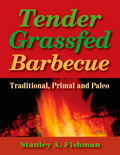
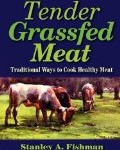
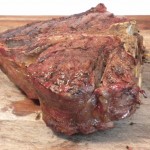 Photos of recipes from the new book Tender Grassfed Barbecue
Photos of recipes from the new book Tender Grassfed Barbecue
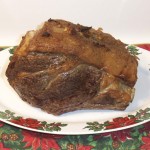 Photos of recipes from the cookbook Tender Grassfed Meat
Photos of recipes from the cookbook Tender Grassfed Meat
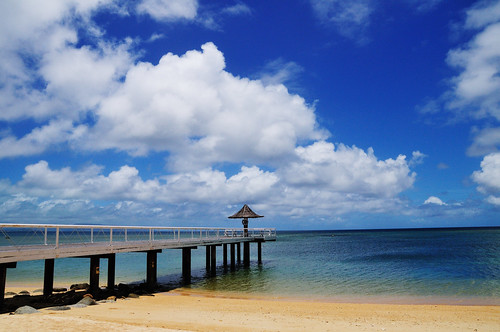

Monday Morning Mix-Up 3/7/11 (Diet Soda vs. Regular Soda, Why Okinawans Live Longer, Flu Vaccines & More…) - Kelly the Kitchen Kop posted on July 19, 2016:
[…] friend, Stan, wrote a great post last week: Eat Fat, Live Long—the Real Food of Okinawa: “You may have heard about the longevity and health of the Okinawan people. According to […]